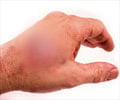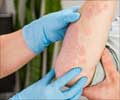Berberine’s antibacterial and anti-inflammatory properties make it a promising treatment for eczema-exacerbated staph infections.
- Berberine can suppress Staphylococcus aureus colonization in eczema patients without causing adverse side effects
- Unlike traditional treatments, berberine does not contribute to antibiotic resistance or steroid withdrawal syndrome
- Berberine’s dual action as an anti-inflammatory and antibacterial agent offers a holistic approach to managing eczema.
Berberine could treat eczema-exacerbated staph infections
Go to source).
Berberine, a compound found in plants like barberry and goldenseal, has been used in traditional medicine for over 3,000 years and is now being studied for its potential to treat modern skin conditions like eczema! #health #eczema #berberine #medindia’
Problem with Current Eczema Treatments
Current eczema treatments include topical antibiotics and corticosteroids. While these can provide temporary relief, they come with significant drawbacks. Prolonged use of topical antibiotics can lead to antibiotic resistance, making infections harder to treat over time (2✔ ✔Trusted SourceStaphylococcus aureus resistance to topical antimicrobials in atopic dermatitis
Go to source). Similarly, corticosteroids can cause topical steroid withdrawal (TSW) syndrome, a condition where the skin becomes dependent on the medication, leading to severe withdrawal symptoms when the treatment is stopped.
Berberine: A Natural Alternative Treatment of Eczema
Berberine, a bioactive compound found in several plants such as barberry, goldenseal, and Oregon grape, has been traditionally used in Chinese and Ayurvedic medicine. Recent studies, including one led by postdoctoral fellow Anish R. Maskey, Ph.D., at New York Medical College, have highlighted berberine’s potential in treating eczema-exacerbated staph infections.The research, presented at ASM Microbe, delves into berberine’s effects on eczema aggravated by Staphylococcus aureus. The study’s findings are promising, showing that berberine can suppress S. aureus colonization and alleviate eczema symptoms without causing adverse side effects.
Anti-Inflammatory and Antibacterial Properties of Berberine
Berberine’s effectiveness lies in its dual action as an anti-inflammatory and antibacterial agent (3✔ ✔Trusted SourceBerberine: A Review of its Pharmacokinetics Properties and Therapeutic Potentials in Diverse Vascular Diseases
Go to source). It reduces inflammation by inhibiting mast cell degranulation, a key mechanism in eczema progression. Mast cells, when activated, release histamine and other chemicals that cause inflammation and itching. By preventing this degranulation, berberine helps reduce the severity of eczema flare-ups.
Furthermore, berberine’s antibacterial properties target S. aureus directly. The compound disrupts the bacteria’s cell walls and inhibits their ability to multiply, reducing the bacterial load on the skin and minimizing the risk of infection.
The research team conducted whole genome sequencing of S. aureus strains isolated from eczema patients. This comprehensive analysis revealed the presence of multiple resistance genes and toxin-encoding genes, underscoring the need for alternative treatments like berberine. The genomic insights also provided mechanistic details on how berberine exerts its effects. Computational modeling identified critical targets in the PI3K/AKT pathways, which are involved in inflammatory responses. By targeting these pathways, berberine helps modulate the body’s immune response, further reducing inflammation.
Advantages of Berberine Over Traditional Eczema Treatments
Berberine offers several advantages over traditional eczema treatments:- Reduced Risk of Antibiotic Resistance: Unlike topical antibiotics, berberine’s natural antibacterial properties do not contribute to the development of antibiotic-resistant bacteria.
- No Steroid Withdrawal: Berberine does not cause TSW syndrome, making it a safer long-term treatment option.
- Multi-Functional: Its combined anti-inflammatory and antibacterial effects address both the symptoms and underlying causes of eczema exacerbated by S. aureus.
Clinical Implications of Using Berberine to Treat Eczema
The findings from Maskey’s study suggest that berberine could be a valuable addition to eczema treatment regimens, particularly for patients struggling with staph infections. Its natural origin and minimal side effects make it an attractive alternative to conventional therapies. However, further clinical trials are necessary to fully establish its efficacy and safety in broader patient populations.For individuals suffering from eczema, incorporating berberine into their treatment plan could provide much-needed relief. Berberine supplements are widely available, but patients should consult with their healthcare provider before starting any new treatment. Topical formulations containing berberine are also being developed, offering a direct application method to affected areas.
Berberine stands out as a promising natural treatment for eczema-exacerbated staph infections. Its ability to suppress Staphylococcus aureus colonization, reduce inflammation, and avoid the pitfalls of traditional treatments positions it as a potential game-changer in eczema management. As research progresses, berberine could become a cornerstone in the fight against this debilitating condition, offering hope to millions of eczema sufferers worldwide.
By focusing on berberine’s unique properties and the latest research findings, this article highlights the potential of a natural compound in addressing a persistent and challenging health issue. For those seeking effective and safer alternatives to conventional eczema treatments, berberine may soon offer a viable and welcome solution.
References:
- Berberine could treat eczema-exacerbated staph infections - (https://www.eurekalert.org/news-releases/1048130)
- Staphylococcus aureus resistance to topical antimicrobials in atopic dermatitis - (https://pubmed.ncbi.nlm.nih.gov/27828633/)
- Berberine: A Review of its Pharmacokinetics Properties and Therapeutic Potentials in Diverse Vascular Diseases - (https://pubmed.ncbi.nlm.nih.gov/35370628/)
Source-Medindia















